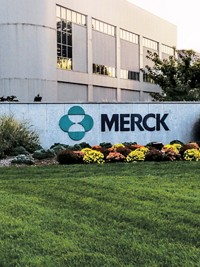Advertisement
Grab your lab coat. Let's get started
Welcome!
Welcome!
Create an account below to get 6 C&EN articles per month, receive newsletters and more - all free.
It seems this is your first time logging in online. Please enter the following information to continue.
As an ACS member you automatically get access to this site. All we need is few more details to create your reading experience.
Not you? Sign in with a different account.
Not you? Sign in with a different account.
ERROR 1
ERROR 1
ERROR 2
ERROR 2
ERROR 2
ERROR 2
ERROR 2
Password and Confirm password must match.
If you have an ACS member number, please enter it here so we can link this account to your membership. (optional)
ERROR 2
ACS values your privacy. By submitting your information, you are gaining access to C&EN and subscribing to our weekly newsletter. We use the information you provide to make your reading experience better, and we will never sell your data to third party members.
Business
Drugmakers pursue next generation of antibodies
Big companies pay small firms to get at new technologies
by Ann M. Thayer
April 27, 2016
| A version of this story appeared in
Volume 94, Issue 18

Seeing monoclonal antibodies rank among the top-selling pharmaceuticals, major drug companies are investing in the next generation of engineered antibodies and antibody-drug conjugates (ADCs). In under a week, AbbVie, GlaxoSmithKline (GSK), and Takeda Pharmaceutical signed deals with small technology firms that together could be worth more than $2 billion.
AbbVie will pay $40 million up front and up to $645 million in milestone payments to help Argenx develop its preclinical cancer immunotherapy ARGX-115. The Dutch firm engineers the targeting, binding, and other features of antibodies created within the immune system of llamas. ARGX-115 targets GARP, a protein linked to immuno-suppressive effects of T cells.
In addition, AbbVie will spend $30 million up front and up to $470 million more to work with CytomX Therapeutics. CytomX designs ADCs with high selectivity for delivering cytotoxic payloads to tumor cells while avoiding healthy cells. An initial target will be the tumor antigen CD17.
Meanwhile, Adimab, a developer of monoclonal and bispecific antibodies, has new partnerships with Japan’s Takeda, the immunotherapy start-up iTeos Therapeutics, and retinal disease-focused Kodiak Sciences. Admiab also says Eli Lilly & Co., Kite Pharma, and Jounce Therapeutics have taken commercial licenses to antibodies generated under existing collaborations.
In another license pact, GSK will pay $36 million up front and up to $872 million in milestones to get Zymeworks’ technology for generating bispecific antibodies. Since December, the two companies have been collaborating on antibody engineering in a deal worth up to $440 million.
With only a handful approved, ADCs and engineered or bispecific antibodies are niche products. But 50 or more of each are in development, and annual market growth could hit 30-40% over the next 10 years, according to the market research firm Roots Analysis. ADC sales, for example, are predicted to grow from about $1 billion today to $10 billion by 2025.
“Monoclonals are very useful, but we are seeing more and more cases where we need extra punch or oomph, and that is where bispecific and ADCs come in,” says David Poon, Zymeworks’ director of R&D alliances. “One of our lead compounds is a bispecific drug conjugate, so we are actually already thinking about combining different aspects of these next-generation platforms.”



Join the conversation
Contact the reporter
Submit a Letter to the Editor for publication
Engage with us on Twitter